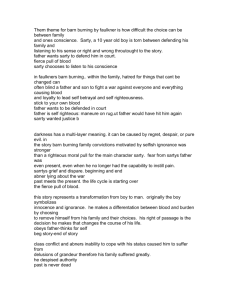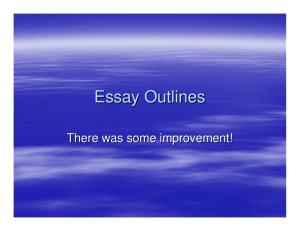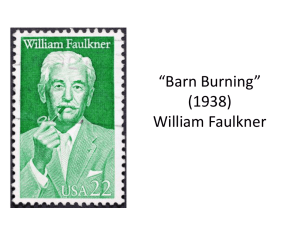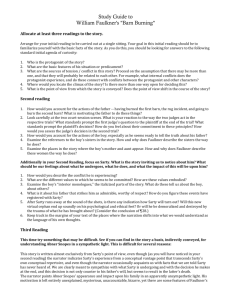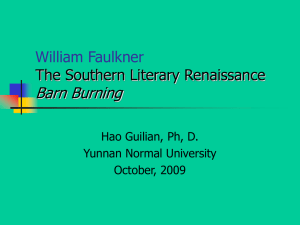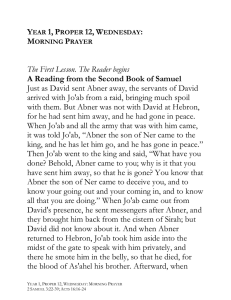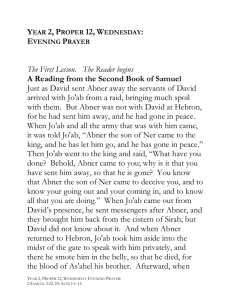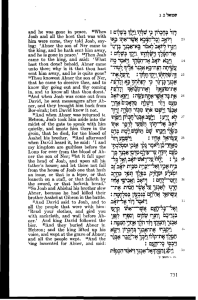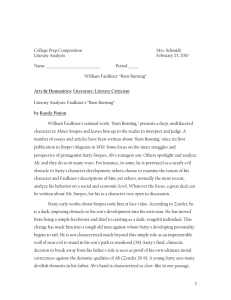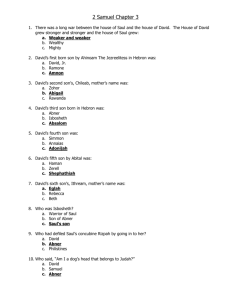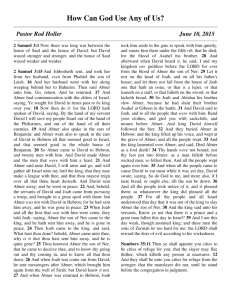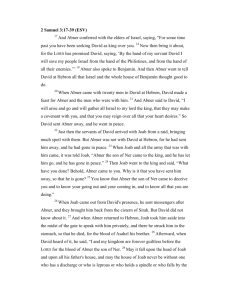Faulkner's Barn Burning: Summary & Analysis
advertisement
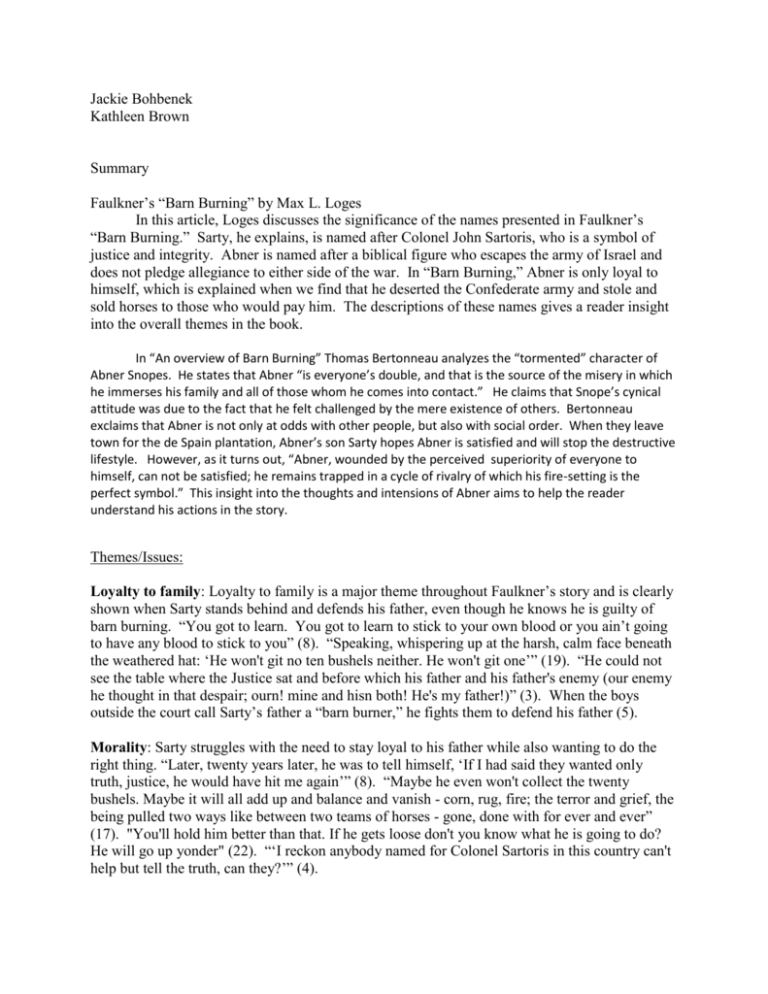
Jackie Bohbenek Kathleen Brown Summary Faulkner’s “Barn Burning” by Max L. Loges In this article, Loges discusses the significance of the names presented in Faulkner’s “Barn Burning.” Sarty, he explains, is named after Colonel John Sartoris, who is a symbol of justice and integrity. Abner is named after a biblical figure who escapes the army of Israel and does not pledge allegiance to either side of the war. In “Barn Burning,” Abner is only loyal to himself, which is explained when we find that he deserted the Confederate army and stole and sold horses to those who would pay him. The descriptions of these names gives a reader insight into the overall themes in the book. In “An overview of Barn Burning” Thomas Bertonneau analyzes the “tormented” character of Abner Snopes. He states that Abner “is everyone’s double, and that is the source of the misery in which he immerses his family and all of those whom he comes into contact.” He claims that Snope’s cynical attitude was due to the fact that he felt challenged by the mere existence of others. Bertonneau exclaims that Abner is not only at odds with other people, but also with social order. When they leave town for the de Spain plantation, Abner’s son Sarty hopes Abner is satisfied and will stop the destructive lifestyle. However, as it turns out, “Abner, wounded by the perceived superiority of everyone to himself, can not be satisfied; he remains trapped in a cycle of rivalry of which his fire-setting is the perfect symbol.” This insight into the thoughts and intensions of Abner aims to help the reader understand his actions in the story. Themes/Issues: Loyalty to family: Loyalty to family is a major theme throughout Faulkner’s story and is clearly shown when Sarty stands behind and defends his father, even though he knows he is guilty of barn burning. “You got to learn. You got to learn to stick to your own blood or you ain’t going to have any blood to stick to you” (8). “Speaking, whispering up at the harsh, calm face beneath the weathered hat: ‘He won't git no ten bushels neither. He won't git one’” (19). “He could not see the table where the Justice sat and before which his father and his father's enemy (our enemy he thought in that despair; ourn! mine and hisn both! He's my father!)” (3). When the boys outside the court call Sarty’s father a “barn burner,” he fights them to defend his father (5). Morality: Sarty struggles with the need to stay loyal to his father while also wanting to do the right thing. “Later, twenty years later, he was to tell himself, ‘If I had said they wanted only truth, justice, he would have hit me again’” (8). “Maybe he even won't collect the twenty bushels. Maybe it will all add up and balance and vanish - corn, rug, fire; the terror and grief, the being pulled two ways like between two teams of horses - gone, done with for ever and ever” (17). "You'll hold him better than that. If he gets loose don't you know what he is going to do? He will go up yonder" (22). “‘I reckon anybody named for Colonel Sartoris in this country can't help but tell the truth, can they?’” (4). Discussion question: Which do you think is more important, Sarty’s loyalty to his family or desire to keep to his morals? Society and Class: There is a constant struggle between upper and lower class shown through Snopes’s rebellion against his “owners.” “I rode down to his house and saw the wire I gave him still rolled on to the spool in his yard” (3) “He said, 'He say to tell you wood and hay kin burn’” (4). “Then with the same deliberation he turned; the boy watched him pivot on the good leg and saw the stiff foot drag round the arc of the turning, leaving a final long and fading smear. His father never looked at it, he never once looked down at the rug” (12). “‘But you never had a hundred dollars. You never will. So I'm going to charge you twenty bushels of corn against your crop’” (16). Alienation: Abner’s destructive nature causes a rift between him and his son, which eventually causes the alienation of Sarty from the rest of his family. ‘Hold him,’ the father said. The aunt made a startled movement. ‘ Not you,’ the father said. ‘Lennie.’ ‘Take hold of him I want to see you do it.’ His mother took him by the wrist” (22). “ But there was no glare behind him now and he sat now, his back towards what he had called home for four days anyhow, his face towards the dark woods which he would enter when breath was strong again, small, shaking steadiliy in the chill darkness, hugging himself into the remainder of his thin, rotten shirt, the grief and despair now no longer terror and fear but just grief and despair. Why do you think Abner felt a strong desire to defy his superiors? Literary Elements: Symbolism: fire: “And older still, he might have divined the true reason: that the element of fire spoke to some deep mainspring of his father's being, as the element of steel or of powder spoke to other men, as the one weapon for the preservation of integrity, else breath were not worth the breathing, and hence to be regarded with respect and used with discretion” (7). Fire symbolizes Abner’s weapon against authority. Whenever a person in a superior position at Abner disrespects him, he retaliates by burning their barn. It is also his comfort because it is what he used to pass nights during the war, and that is why he uses it against figures of authority. Irony: Abner always perceives himself as a powerful white man, yet he is always described a wearing black, the one color he has been fighting against his whole life not to be. “Stiff black coat” (5). “Black, flat, and bloodless” (8). “A small fire, neat, niggard almost” (7). (the word niggard means “stingy” but used in this context sounds like a racial slur) Repetition: stiff, black: “His father turned, and he followed the stiff black coat, the wiry figure walking a little stiffly from where a Confederate provost's man's musket ball had taken him in the heel” (5). “And once more he followed the stiff back, the stiff and ruthless limp, up the slope and on to the starlit road” (8). Cold, harsh: “His father spoke for the first time, his voice cold and harsh, level, without emphasis (5). His father's hand jerked him back, the harsh, cold voice speaking above him”(6). “the voice harsh like tin and without heat like tin” (8). Silhouette: “He could see his father against the stars but without face or depth-a shape black, flat, and bloodless” (8). The last thing the boy remembered was the depthless, harsh silhouette of the hat and coat bending over the rug and it seemed to him that he had not even closed his eyes when the silhouette was standing over him” (14). Discussion question: Why do you think Abner was always described as a silhouette? Similie: “The voice harsh like tin and without heat like tin” (8). Discussion questions: Why are the sisters always described as large and bovine?
